From prison to film set, this program creates a new pipeline

- Share via
Artie Gonzales was in the middle of a shift at Walmart when he found out he had landed a job as a production assistant. He quit Walmart on the spot.
As a child, he had dreamed of being an actor. Instead, he became a gang leader, landing in prison at age 16 and serving 21 years.
He was struggling to make ends meet when a friend told him about ManifestWorks, which helps people who have been homeless, in prison or in foster care find work in film and television.
Some participants were convicted of crimes ranging from violating a juvenile probation curfew to murder. Others spent months living out of a car. The program builds on the tenacity and hustle they honed in overcoming hardship to teach them the tools of the trade as well as habits like being on time.
Founded by former journalist Dan Seaver and filmmaker Chip Warren in 2014, ManifestWorks has graduated 257 students, training them as production assistants and establishing a pipeline to high-paying union jobs. Alumni, including Gonzales, have become six-figure earners. Some own their homes. And as far as Seaver knows, only one has ended up in prison.
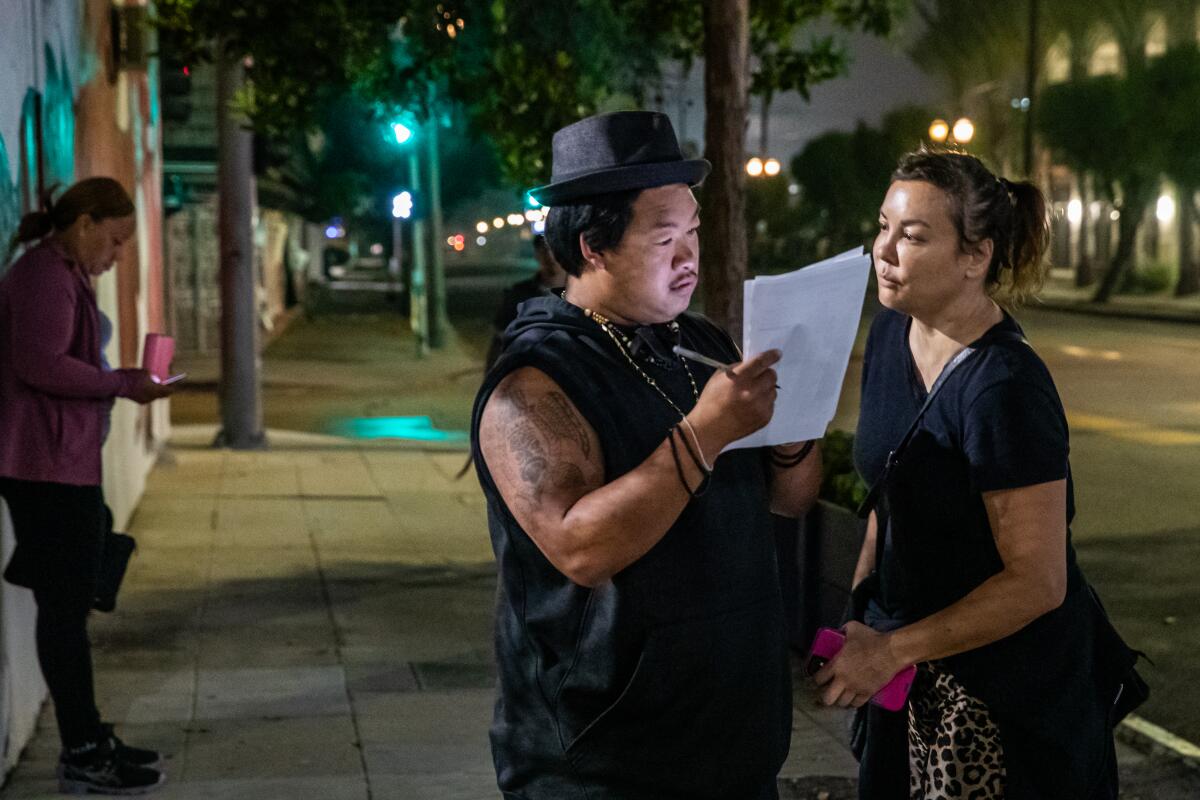
“ManifestWorks was the first place in my life where someone saw my value as a person and invested in me,” said Gonzales, 45, who has worked on TV shows including “Snowfall,” “Shameless” and “Grey’s Anatomy.” He hopes to act in a series he co-wrote.
On a Saturday morning in July, call time was 5:30 a.m. — a lesson in punctuality to prepare for an industry where early starts are the norm.
At 4 a.m., three heavy-eyed students were already pacing the sidewalks around Quixote Production Supplies on North Cahuenga Boulevard. As the sun crept up, the crowd mushroomed to about 30 and spilled into the warehouse’s driveway.
“Call people and figure out who’s missing,” program coordinator Young Ji said, nodding at a student named Pono.
Assigned to be the “assistant director” for the class that week, Pono was responsible for taking attendance, keeping everyone on schedule and completing a report afterward. After this week, he and others who played roles like producer, talent coordinator and location manager would be eligible for a job with a ManifestWorks partner before they even completed the 10-week program.
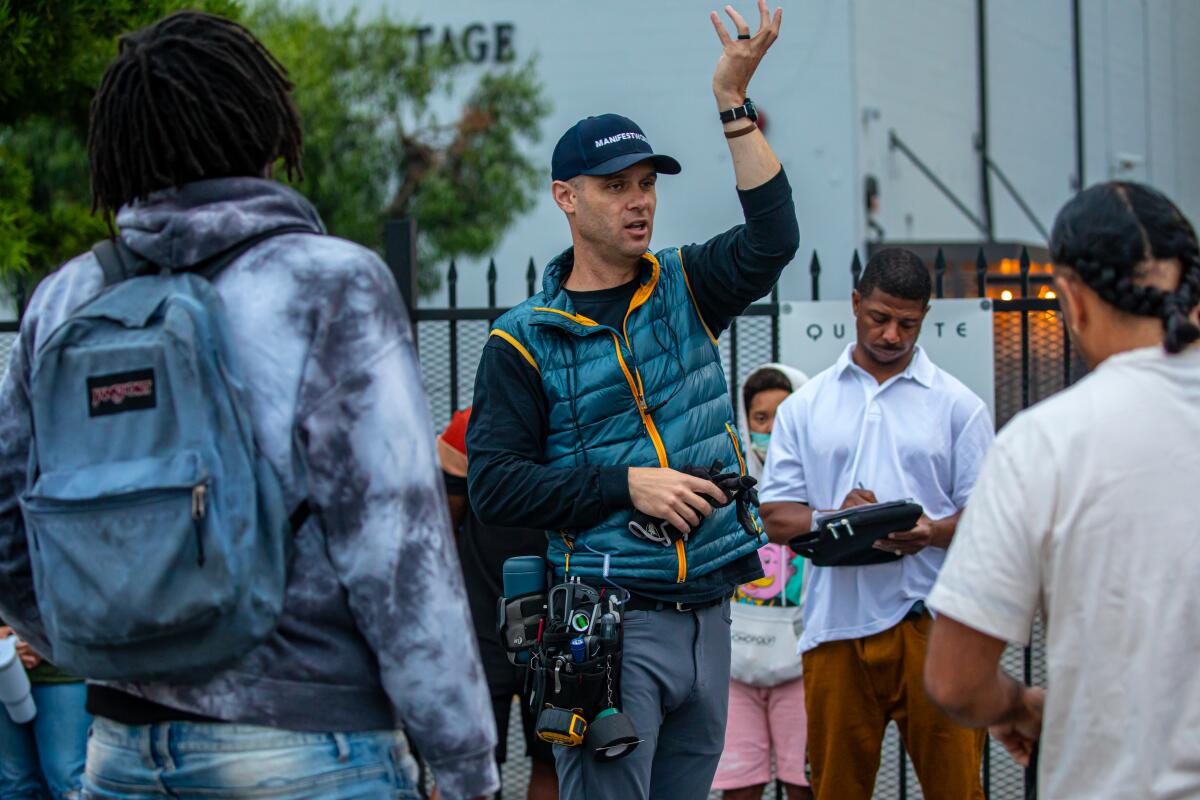
Pono, originally from Hawaii, counted three of 32 classmates absent. Those who miss more than one “benchmark,” like making call time or creating a professional email account, are dropped from the program.
Pono found out about ManifestWorks from Gonzales, who served time with him in Northern California years ago and became his mentor.
Like most of the students, Pono did not want his last name published, saying he feared his job prospects would be affected by his background. He declined to discuss what landed him in prison.
“A quote that has motivated me through the program is, ‘A year from now, I wish I started today,’” Pono said. “This is where I want to be.”
Seaver, 56, now ManifestWork’s executive director, said the program aims to capitalize on the “miraculous” opportunities that exist in the Los Angeles entertainment industry.
Production assistant, or PA, work is an easy way in — one that doesn’t require a degree or background check. Duties include running errands for producers and directors, setting up props, lighting and equipment, and coordinating on-set catering.
The job provides contact with every department on set, eventually enabling PAs to climb the ladder and choose a specialty. Many go on to work for higher-paid crews or unions.
ManifestWorks, which is a nonprofit, has an annual budget of about $950,000, funded through government grants and donations, including from Hollywood heavyweights.
About 500 apply each year, with about 240 making it to orientation. In an industry that has sorely lacked diversity, 86% of students identify as Black, Latino, Asian American or multi-ethnic.
ManifestWorks grew out of Seaver’s experience teaching at a juvenile detention facility and keeping in touch with his students.
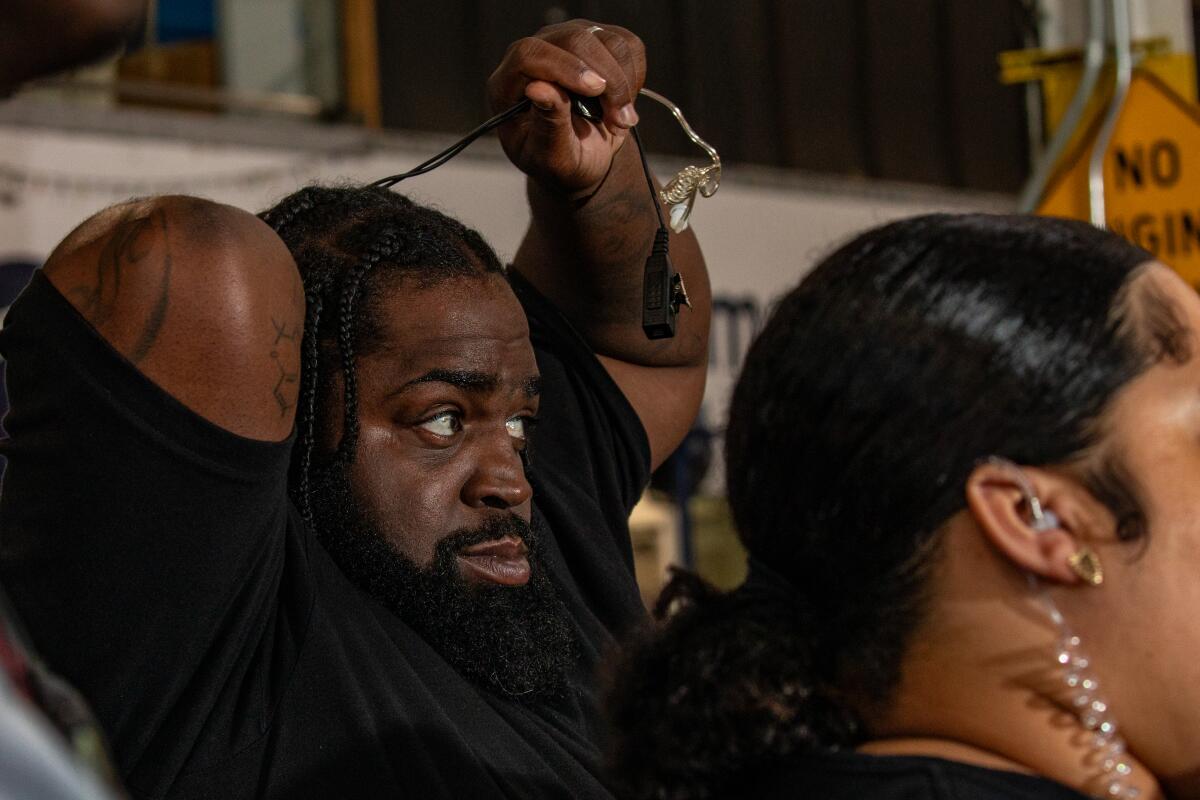
After connecting a former student to an office PA job, then watching the student struggle, he decided to craft a program that would provide professional and emotional support for those launching similar careers.
Unfamiliar with the entertainment industry, Seaver cornered parents at his kids’ school who worked as composers, production designers and actors. In the beginning, he taught most sessions himself. Some weekends, Warren would take his place.
The pair invited film and TV producers to sit in on classes and sometimes speak to students. Those employers became supporters of the program and spread the word to others. Now, Warner Brothers, Sony and Netflix are among the companies that hire ManifestWorks graduates.
Merri Howard, an Emmy-nominated producer known for her work on “Star Trek” and “Little Fires Everywhere,” said it’s satisfying to give a leg up to people with difficult pasts.
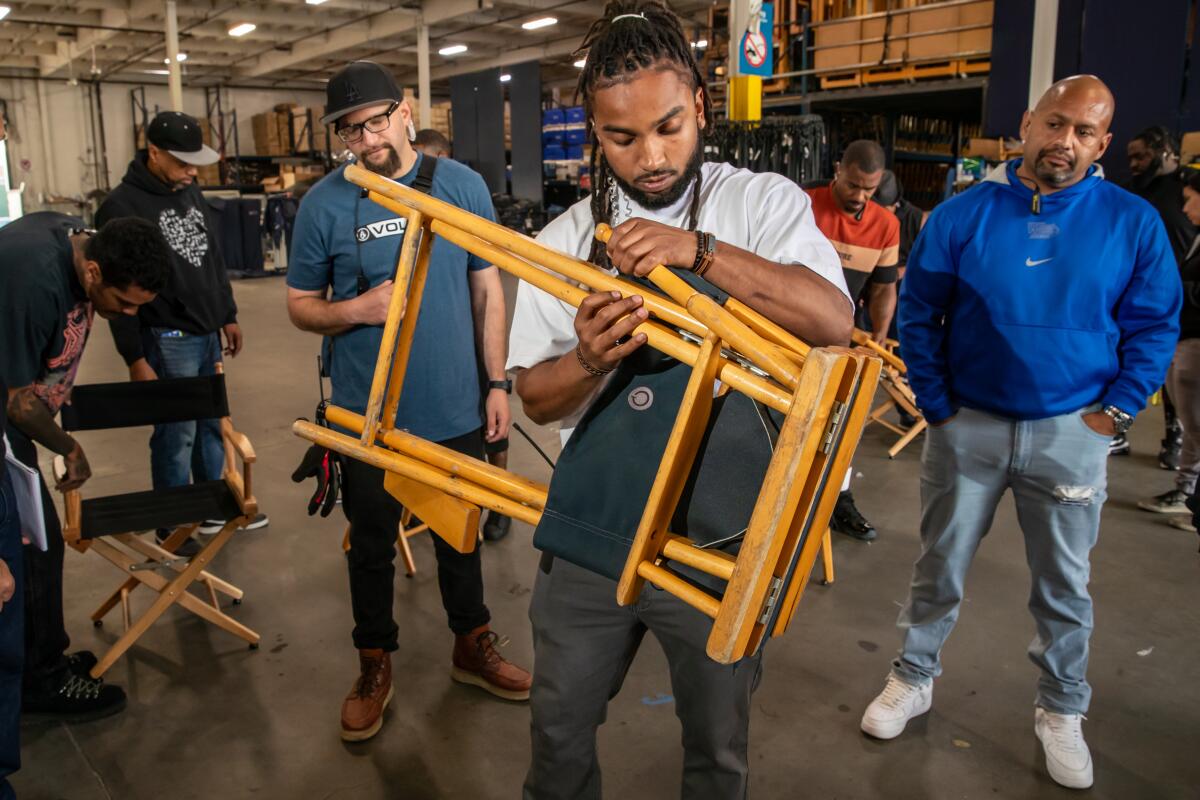
When she hires for a new production, she considers ManifestWorks first.
“Participants are usually older, bringing more maturity to the job,” Howard said. “I am always looking for someone who doesn’t have that sense of entitlement. They show such gratitude, willingness and drive.”
After roll call that Saturday morning, the group shuffled into Quixote’s warehouse, where veteran PA Quinn Moran and ManifestWorks alumni Matt Adler and Salim Allen led a workshop on walkie-talkies, tents and directors’ chairs.
Both Adler and Allen have served time in prison. Allen graduated from ManifestWorks in 2018 and recently joined the Teamsters Local 399 union as a truck driver. Adler, who would start a new job at Universal the following week, graduated a few months ago. Amid industry-wide strikes, he has picked up 10 gigs.

Someday, Adler hopes to join a union, as nearly 30% of alumni have. On average, production assistants make $40,000 annually, with union members making up to four times that much.
“ManifestWorks has allowed me to recover and step above what I’ve been through,” Adler said. “It has opened the door for me to get into something that I never thought was possible.”
Next, Moran tasked two students, Jessie, 26, and Emmanuel, 56, with passing out “hot bricks,” or walkie-talkies.
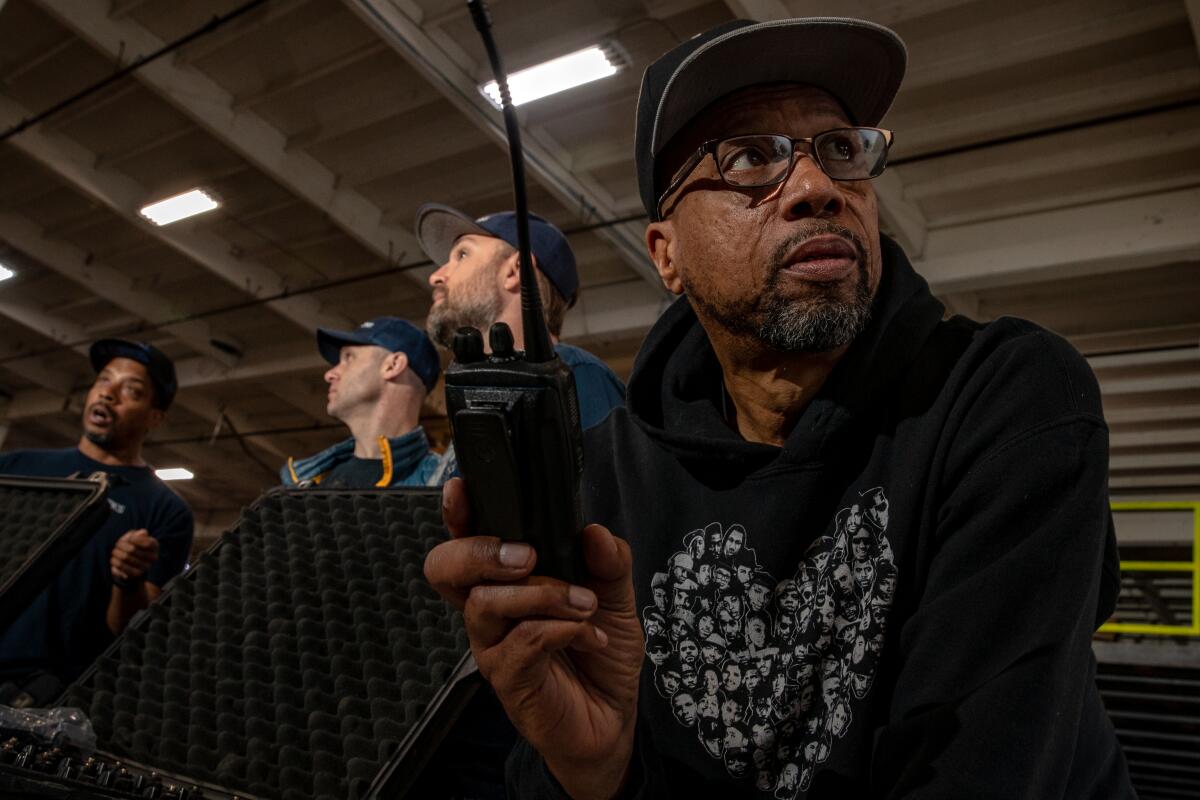
“We’re not just going to teach you about equipment… We’re going to teach you about demeanor and how you go about things on set,” said Moran, who is now vice president of sales for the digital payroll company Wrapbook.
Squinting behind the hair that fell in his face, MuuMu, 20, studied the different types of cones used to keep civilians off production sets. He has never been to prison but was eligible for the program because his father, an alum, was incarcerated. He drove four hours from Las Vegas for class each week.
Would there be more 5 a.m. sessions? he asked.
“For the class, no,” Ji replied. “For work, all the time.”
More to Read
Sign up for Essential California
The most important California stories and recommendations in your inbox every morning.
You may occasionally receive promotional content from the Los Angeles Times.











